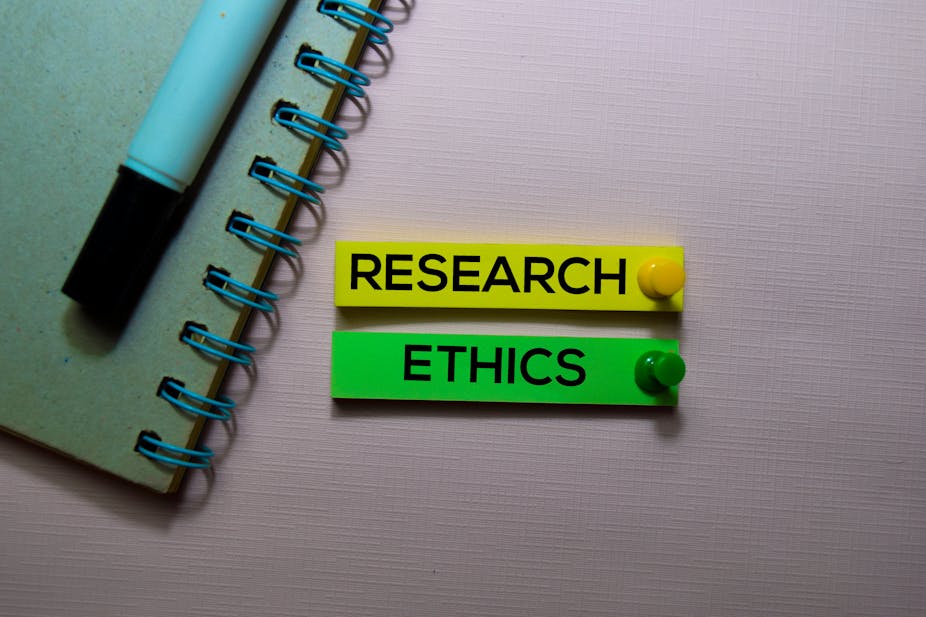Academic research is not always abstract or theoretical. Nor does it take place in a vacuum. Research in many different disciplines is often grounded in the real world; it aims to understand and address problems that affect people and the environment, such as climate change, poverty, migration or natural hazards.
This means researchers often have to interact with and collect data from a wide range of different people in government, industry and civil society. These are known as research participants.
Over the last 50 years, the relationship between researcher and participant has fundamentally changed. Previously, research participants were viewed merely as objects of study. They had little input into the research process or its outcomes. Now, participants are increasingly viewed as collaborative partners and co-creators of knowledge. There are also many ways in which they can engage with researchers. This shift has been largely driven by the need for research that is relevant to today’s world as well as greater recognition of the diversity of people and cultures, and the internet, social media and other communication tools.
In this context, ethical research practices are more important than ever. However, guidelines and standards for research ethics vary between country and institution. Expectations may also vary between disciplines. So, it’s a good time to identify the key issues in human research ethics that transcend institutional or disciplinary differences.
Issues to consider
I am a long-time chair of one my institutions’ research ethics committees, and I do research ethics training for researchers and managers across southern Africa. I have also published on research ethics. Based on this experience and drawing from other work done on the topic, I suggest there are five critical ethics issues for researchers to consider.
Managing vulnerability: Research participants, especially in the developing world, may be potentially vulnerable to coercion, exploitation and the exertion of soft power.
This vulnerability may arise because of systemic social, economic, political and cultural inequalities, which are particularly marked in developing countries. And it may be amplified by inequalities in healthcare and education. Some groups in any society – among them minors, people with disabilities, prisoners, orphans, refugees, and those with stigmatised conditions like HIV and AIDS or albinism – may be more vulnerable than others.
This issue can be managed by considering what the participant group is like and by making sure that the data collection process does not increase any existing vulnerabilities.
Obtaining informed consent: This is a key precondition for participation in any study. Potential participants should first be informed about the nature of the study and the terms and conditions of their participation. That includes details about anonymity, confidentiality and their right to withdraw.
The researcher then needs to ensure that the potential participant understands this information and has the opportunity to ask questions. This should be done in a language and using words that the person can understand. After these steps are taken, the participant can give informed consent. Informal (verbal or any other non-written) consent is more appropriate if participants are not literate or are particularly vulnerable.
Protecting people: The overarching principle of protecting research participants was articulated in the landmark Belmont Report. The report emerged from a national commission in the US in the 1970s to consider research ethics principles. It called for researchers in any study to demonstrate non-maleficence (the principle of not doing harm) and ensure that they protect both participants and their data.
This can be done at different stages through the research process: by decreasing the potential for risk or harm through careful study design; by providing support or counselling services to participants during or after data collection; and by maintaining confidentiality and anonymity in data collection and reporting. Finally, personal data must be protected or de-identified if they are being stored for later analysis.
Managing risk: Potential sources of risk or harm to participants should, as far as possible, be identified and mitigated when the study is being designed. Risk may arise in any study, either at the time of data collection or afterwards. Sometimes this is unexpected, such as where data collection becomes more dangerous due to civil unrest or under COVID-19 restrictions.
It is important that researchers provide the details of support or counselling service for participants in case these are needed. Any trade-offs between risk and benefits can be considered through a risk-benefits analysis. But researchers should be realistic about any potential benefits that may result from their study.
Championing human rights: Researchers have responsibilities: to their disciplines, funders, institutions and participants. This means they should not merely be passive analysers of data. Instead they should be positive role models in society by seeking solutions, advocating for change and upholding human rights and social justice through their actions.
Research activities, especially those involving participants, should address and find solutions for local and global problems. They ought to result in positive societal and environmental outcomes. This should be the context for all types of research activities in a 21st century world.
Making it happen
Increasingly, there are national and international codes of research ethics, guiding researchers in different fields. An example is the 2010 Singapore Statement on Research Integrity. It emphasises the principles of honesty, accountability, professional courtesy and fairness, and good stewardship of data. These are the characteristics not just of ethical researchers, but of good researchers too.
These principles and processes should make research less risky and protect the rights of participants by building trust between researchers and participants. These principles can also help in making research more transparent, accountable and equitable – critical in an increasingly divided and unequal world.

